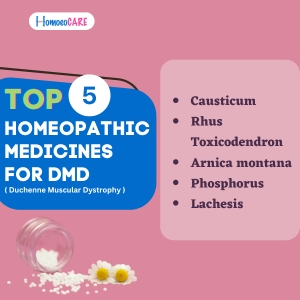Duchenne Muscular Dystrophy (DMD): Overview and Homeopathic Treatment
What is Duchenne Muscular Dystrophy (DMD)?
Duchenne Muscular Dystrophy (DMD) is a rare, inherited genetic disorder marked by progressive muscle weakness and degeneration, predominantly affecting young boys. This condition stems from a mutation in the dystrophin gene, leading to a deficiency or absence of dystrophin, a protein crucial for muscle strength and stability.
What is Dystrophin?
Dystrophin, often referred to as “muscle glue,” is a large protein responsible for maintaining the structural integrity of muscle cells. Produced by the dystrophin gene, this protein stabilizes muscle cells during contractions. In individuals with DMD, a lack of dystrophin weakens muscle fibers, resulting in progressive muscle damage and impaired motor functions.
Pathophysiology of DMD
In DMD, the absence of dystrophin leaves muscle fibers vulnerable to damage during physical activity. This triggers an inflammatory response, which over time leads to the replacement of healthy muscle tissue with fibrous or fatty tissue. This process causes gradual muscle weakness and loss of function.
Complications of Untreated DMD
If left untreated, DMD can result in significant complications, including:
- Mobility Issues: Progressive muscle weakness can lead to difficulty walking and eventual loss of mobility.
- Respiratory Challenges: Weakening of respiratory muscles can impair breathing and lead to respiratory failure.
- Cardiac Problems: The heart muscle may also be affected, increasing the risk of cardiomyopathy and heart-related complications.
These challenges can greatly impact the patient’s quality of life and reduce their lifespan, underscoring the importance of early diagnosis and comprehensive management.
